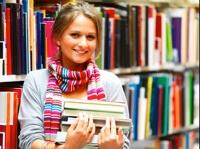Education
Typ práce: Maturita
Jazyk:
Počet zobrazení: 44 323
Uložení: 1 158
Education
Talk about:
- School & classroom
- The school year + favourite subject
- The system of education in:
- Slovakia
- Great Britain
- the USA
- After-school activities
- Your ideal school
- Social situations at school – apologies…
- Qualities of the teacher and the student
Education is a process of teaching and learning.
SCHOOL & CLASSROOM
Our school has 2 buildings. One building is for theoretical education and the other building is for practical education. Our school has a sportsground and a gym. In the building for theoretical education there is:
- a hallway – chodba
- cloakrooms – šatne
- a staircase – schodisko
- teachers’ offices – učiteľské kabinety
- the deputy head’s office – zástupcova kancelária
- the administrative office – kancelária administratívy, sekretariát
- classrooms - triedy
- a school library – školská knižnica
- a computer room – miestnosť s počítačmi
- toilettes – toalety
In the building for practical education there is:
- the principal office – riaditeľova kancelária
- the food canteen – školská jedáleň
- workshops – dielne
- machines - stroje
- technical equipment – technické zariadenie
Our classroom is big. There are large windows opposite the door, rows of school desks and chairs. In our classroom we also have:
- a blackboard and chalks – tabuľa a kriedy
- a sponge – špongia
- a teacher’s desk – učiteľský stôl, katedra
- a notice board - nástenka
- a waste basket – odpadkový kôš
- a class-register – triedna kniha
THE SCHOOL YEAR:
The school year in Slovakia starts on 2nd of September and ends in June /on the 30th of June/. We have 2 terms – a summer term and a winter term. In July and August we have holidays. We also have a few days off school in autumn, during Christmas and a week holiday in spring. We have on average 7 lessons a day. A lesson is 45 minutes long. Between the lessons we have breaks that are 5 or 10 minutes long. We also have a lunch break which is 30 minutes long. Students are evaluated by marks on the scale from 1 to 5 – 1 is the best and 5 is the worst.
During the school year we have some special events – for example:
* sport events – športové udalosti
* school trips – školské výlety
* we go to the cinema
* parent-teacher meetings – rodičovské združenia
* graduation balls – stužkové slávnosti
Subjects taught at school during the school year /Predmety vyučované na škole počas školského roka/:
- compulsory - povinné
- optional / elective/ - voliteľné
- maths /mathematics/ - matematika
- physics – fyzika
- chemistry – chémia
- biology – biológia
- geography – zemepis
- history – dejepis
- foreign languages – cudzie jazyky
- technical subjects – technické /odborné/ predmety
- PE /physical education/ - telesná výchova
- religious education – náboženstvo
- natural sciences – prírodoveda
- social sciences – spoločenské vedy
My favourite subject:
My favourite school subject is PE /physical education/ because I like sport. I especially like playing ball games such as football and basketball.
I don’t like mathematics because I don’t like numbers.
THE EDUCATIONAL SYSTEM IN SLOVAKIA:
The general education in Slovakia is free of charge – you don’t have to pay if you go to a state school but in most private schools you have to pay fees. School attendance in Slovakia is compulsory for children aged from 6 to 15 years.
In Slovakia we have:
a) state schools – štátne školy
b) private schools – súkromné školy
c) church schools – cirkevné školy
Education in Slovakia has these stages:
1. PRE-SCHOOL EDUCATION /predškolské vzdelávanie/ - it includes nursery schools and kindergartens. They are for children from 3 to 6 years old.
2. PRIMARY SCHOOLS /základné školy/ - children start attending primary schools when they are 6 years old and finish when they are 15 years old. The children at primary schools study these subjects: mathematics, physics, Slovak language, a foreign language, geography, history and so on.
3. SECONDARY SCHOOLS /stredné školy/ – it usually takes from 3 to 4 years to complete secondary education. To complete secondary education you have to pass the final exam. We have to pass the school leaving examination.
When children finish the primary school, they can choose one of the following secondary schools:
a) grammar schools – /gymnáziá/ – they prepare students for the university study
b) special schools – /špeciálne školy/ – they include:
* technical colleges – technické školy
* business academies – obchodné akadémie
* music and art schools – hudobné a umelecké školy
c) vocational schools – /odborné učňovské školy/ – these are apprentice schools that train their students for practical jobs – for example to become:
- a shop assistant - predavač
- a plumber – vodoinštalatér
- a builder - murár
- a carpenter – stolár
4. UNIVERSITIES /vysoké školy/ - if you pass the entrance exam, you can go to a university. The university study takes from 4 to 6 years. When you successfully finish university, you get a diploma and you are awarded with a degree. For example:
Bachelor’s Degree = Bc.
Master’s Degree = Mgr.
5. FURTHER EDUCATION /ďalšie vzdelávanie/ - it includes different kinds of training courses. You usually have to pay for them.
THE BRITISH SYSTEM OF EDUCATION:
The compulsory school attendance in Britain starts at the age of 5.
Children start primary education – it is divided into infant schools and junior schools. Pupils at most of the primary and secondary schools have to wear uniforms, which are usually different for every school.
At the age of 11, most children start secondary education - it is compulsory until the age of 16, when the students take an exam called “GCSE” (General Certificate of Secondary Education). Students, who pass the GCSE exam can attend a 2-years long course and take A-levels examination. They can go to university only if they pass A-levels.
THE AMERICAN SYSTEM OF EDUCATION:
In the USA there is no national system of education. Each of the 50 American states has its own laws (zákony) that regulate education. Children begin school at the age of 5 or 6 and finish at the age of 16 or 18.
American children attend:
a) elementary schools (ZŠ)
b) middle school – children attend the middle school for 3 years
c) secondary schools that are called high schools – when they finish, they get a high school diploma. During the school attendance, children have to take the Stanford Achievement Test – the results of this test are important if the student wants to attend a college or a university.
AFTER-SCHOOL ACTIVITIES AT OUR SCHOOL:
After school we can play football, basketball or other ball games in the gym. We can join a computer group in our school or attend free English lessons provided by our school teachers. We also have a tourist’s after school activity /turistický krúžok/ at our school.
THE IDEAL SCHOOL:
I would change some rules. For example I can imagine school without any school marks. Sometimes the marks are a big problem. Students are stressed out and afraid of having bad marks. I think that school education could be more practical. We should be prepared for the future job and career, for the university study. Sometimes we have to memorize too many things that we don’t really need in real life. And I think teachers should understand the problems of the young generation.
I wouldn’t like to be a teacher. Slovak teachers are not satisfied. They want better conditions. They need new books, teaching materials, technical equipment like computers for better teaching. And students are often very undisciplined which makes teaching difficult.
But If I had to teach I would like to teach PE /Physical Education/ and Computer Sciences because I like sport activities and computers.
School uniforms:
Many students in Great Britain or the USA must wear the school uniforms – it is compulsory. I think the most important advantage is that there is no difference between the poor and the rich. I think that boys don’t mind wearing school uniforms but girls like fashion and they couldn’t show their new clothes. I wouldn’t like to wear a school uniform. I like wearing jeans and T – shirts because it is more comfortable.
SOCIAL SITUATIONS /spoločenské situácie/ AT SCHOOL:
When the student comes to school and he is not prepared for the lesson or he is late, he should apologize to the teacher. He can say:
I would like to apologize because:
- I’m late. I missed my bus. / My bus was late. = Meškám. / Zmeškal som autobus. / Môj autobus meškal.
- I’m not prepared for today’s lesson because I was ill last week / I was absent yesterday. = Nie som pripravený na dnešnú hodinu pretože som bol chorý minulý týždeň. / Včera som chýbal.
- I have forgotten my book / homework. = Zabudol som si knihu / domácu úlohu.
A teacher can be:
ideal - ideálny
strict – prísny
lenient – mierny
enthusiastic – entuziastický, zanietený /pre svoju prácu/
demanding – náročný
patient – trpezlivý
with a sense of humor – so zmyslom pre humor
punish – potrestať
A student can be:
negligent – nedbalý
disciplined - disciplinovaný
undisciplined – nedisciplinovaný
disobedient – neposlušný
cheeky – drzý
gifted – nadaný
talented – talentovaný
ambitious – ambiciózny
hard-working – usilovný
lazy – lenivý
inattentative - nepozorný
clever – múdry
intelligent – inteligentný
good at – dobrý v /I’m good at English. = Som dobrý v angličtine./
poor at – slabý v /I’m poor at Maths. = Som slabý v matematike./
cheat – podvádzať /odpisovať .../
play truant – chodiť poza školu
be absent - chýbať
Answer these questions:
- How much money do you spend on education and things related to it? /Koľko peňazí miniete na vzdelávanie a veci s tým spojené?/
- Why do students cheat at school? /Prečo žiaci v škole podvádzajú?/
- Are teacher-parent meatings helpful? In what way? Give reasons. /Sú rodičovské združenia nápomocné? Akým spôsobom? Uveďte dôvody./
- Education in Slovakia has been free of charge for a long time. Many people now think that the university students should pay tuition fees. What positives/negatives will paying school fees have? /Vzdelávanie na Slovensku bolo dlhý čas bezplatné. Veľa ľudí si teraz myslí, že vysokoškolskí študenti by mali platiť za vzdelávanie poplatky. Aké pozitíva/negatíva bude mať platenie školských poplatkov?/
- Is truancy a serious problem in Slovak schools? /Je chodenie poza školu vážnym problémom slovenských škôl?/
- What should be done to make students attend school regularly? /Čo by sa malo urobiť, aby žiaci navštevovali školu pravidelne?/
- What subjects do you consider to be the most boring? Why? /Ktoré predmety považujete za najnudnejšie? Prečo?/
- Would you like to study abroad? What are the advantages and disadvantages of studying in a foreign country? /Chceli by ste študovať v zahraničí? Aké výhody a nevýhody má štúdium v cudzej krajine?/
Vocabulary:
education – vzdelávanie, vyučovanie
a curriculum – učebný plán, školská osnova
to complete education – ukončiť vzdelávanie
classroom – trieda
opposite – oproti
rows of school desks – rady školských lavíc
a building – budova
a building for theoretical education – budova pre teoretické vyučovanie
a building for practical education – budova pre praktické vyučovanie
a floor – poschodie
a sportsground – športové ihrisko
a gym – telocvičňa
term – polrok
a few /fjú/ - pár, zopár
day off school – voľný deň, deň kedy žiaci nejdú do školy
spring – jar
summer – leto
autumn – jeseň
winter – zima
on average – priemerne
lesson – vyučovacia hodina
a break – prestávka
a lunch break – obedňajšia prestávka
evaluate – ohodnotiť
on the scale – na škále
the best – najlepšie
the worst – najhoršie
during – počas
special events – špeciálne udalosti
a subject – predmet
teach (min. čas taught = vyslovuje sa /tót/) - učiť, vyučovať
favourite – obľúbený
like – mať rád
don’t like – nemať rád
general – všeobecný
free of charge – bez poplatku
pay fees / pay charges – platiť poplatky
have to – musieť
don’t have to – nemusieť
attend – navštevovať /školu/
school attendance – školská dochádzka
compulsory – povinný
stage – úroveň
include – zahŕňať
pre-school education – predškolské vzdelávanie
a nursery school – škôlka
a kindergarten – škôlka
a primary school – základná školy
a secondary school – stredná škola
a boarding school – internátna škola
further education – ďalšie vzdelávanie
take – trvať => It takes from 3 to 4 years to complete secondary education. = Ukončenie stredoškolského vzdelania trvá od 3 do 4 rokov.
an exam – skúška
an entrance examination – prijímacia skúška
a final examination – záverečná skúška
a school-leaving examination – maturitná skúška
a report – vysvedčenie
General Certificate of Education – maturitné vysvedčenie
a diploma – diplom
to take an exam – robiť skúšku
to pass an exam – spraviť skúšku /úspešne/
to fail an exam – nespraviť skúšku
choose – vybrať si
following – nasledujúci
prepare – pripraviť
become – stať sa /niečím, niekým/
awarded with – odmenený /niečím/
a degree – titul
a training course – kurz /napr. rekvalifikačný/
system of education – systém vzdelávania
an infant school – škola pre mladšie deti /5 – 7 rokov/
a junior school – škola staršie deti /7 – 11 rokov/
GCSE - výstupný certifikát zo strednej školy - v Británii
A – levels – maturitné vysvedčenie – v Británii
course - kurz
national system – národný systém
each of – každý z
a state - štát
law – zákon
regulate – regulovať, upravovať
middle – stredný
high school – stredná škola v USA
Stanford Achievement Test – monitor /v USA/
a result – výsledok
take part – zúčastniť sa
Would you like...? – Chcel by si...?
after-school activities – mimoškolské aktivity
satisfied – spokojný
conditions – podmienky
you should – mal by si
change – zmeniť
rules – pravidlá
imagine – predstaviť si
stressed out – vystresovaný
afraid of – báť sa, obávať sa /niečoho/
prepare – pripraviť sa
future – budúci, budúcnosť
career – kariéra
memorize – memorovať
too many – príliš veľa
need – potrebovať
difference – rozdiel
the poor – chudobní
the rich – bohatí
mind – vadiť
wear – nosiť /oblečené/
boys don’t mind wearing school uniforms – chlapcom nevadí nosenie školských uniform
fashion – móda
show – ukázať
I could – mohol by som
a school boy / school girl – školák, školáčka
a pupil – žiak
a student – žiačka
an apprentice – učeň
a graduate – absolvent VŠ
teaching staff – učiteľský zbor
a teacher – učiteľ
a headmaster – riaditeľ školy
a headmistress – riaditeľka školy
a principal – riaditeľ školy
a deputy head – zástupca
provided by – zabezpečnený /niekým/
provide - zabezpečiť
| Podobné práce | Typ práce | Rozsah | |
|---|---|---|---|
|
|
Education (konverzačná téma) | Ostatné | 2 370 slov |
|
|
Education – Sloh po anglicky vzdelanie | Referát | 1 119 slov |
|
|
Education | Ostatné | 2 418 slov |
|
|
Education essay | Maturita | 757 slov |
|
|
Education – UK, USA (Anglický jazyk) | Maturita | 852 slov |
|
|
Education (Anglický jazyk) | Maturita | 611 slov |
|
|
The System of education in GB and CZ – maturitná otázka | Maturita | 1 829 slov |
|
|
Education topics to talk about | Maturita | 2 886 slov |
|
|
Education (slovné spojenia a frázy) | Maturita | 613 slov |
|
|
Education in Slovakia | Ostatné | 521 slov |
|
|
Education – Vypracované zadanie na VIDEO | Maturita | 9 slov |
|
|
Education (topic, essay, vocabulary) | Ostatné | 630 slov |
|
|
Education téma | Maturita | 832 slov |
|
|
Education | Učebné poznámky | 507 slov |
|
|
Education in Slovakia, Great Britain, and the USA – osnova na prezentáciu | Ostatné | 269 slov |
Vyhľadaj ďalšie študentské práce pre tieto populárne kľúčové slová:
#Education #education maturitná téma #education maturita #slohy z anglictiny na temu vyhody a nevyhody skoly #education anika #vyhody a nevyhody skoly #education referát #an ideal school #temy eseji na anglicky jazyk #my school #education angličtina #education slovná zásoba #school #my favourite subject #school and education maturita #school system in slovakia advantages/disadvantages #ideal school #EDUCATION SLOH #dream school #educations















